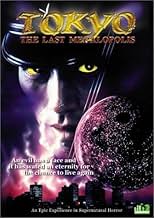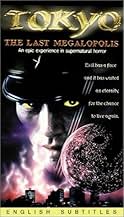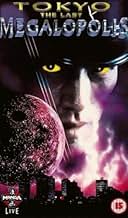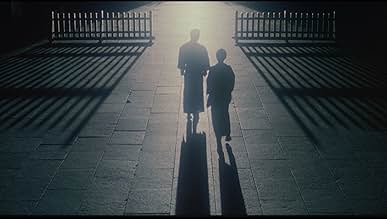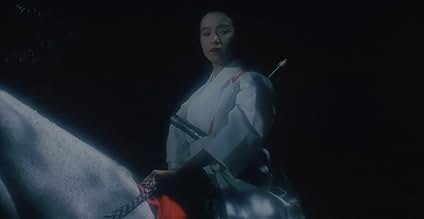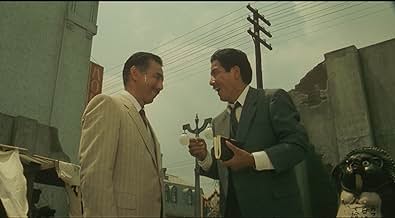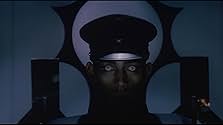Füge eine Handlung in deiner Sprache hinzuA demonic reincarnation of a Japanese general from the 10th century appears in the early 20th century Tokyo with a mission to destroy the blooming city.A demonic reincarnation of a Japanese general from the 10th century appears in the early 20th century Tokyo with a mission to destroy the blooming city.A demonic reincarnation of a Japanese general from the 10th century appears in the early 20th century Tokyo with a mission to destroy the blooming city.
- Regie
- Drehbuch
- Hauptbesetzung
- Auszeichnungen
- 2 Nominierungen insgesamt
Jun'ichi Ishida
- Yoichiro Tatsumiya
- (as Junichi Ishida)
Bunshi Katsura VI
- Shigemaru Kuroda
- (as Sanshi Katsura)
Tamasaburô Bandô
- Kyoka Izumi
- (as Tamasaburo Bando)
Empfohlene Bewertungen
I was really hoping to get into this more than I did. It feels like all the ingredients were there, but it feels too long to be a fun and direct genre movie, but not long or deep enough to satisfy as an epic.
That being said, part of my lack of enjoyment may come from not knowing enough Japanese history or folklore - I feel like knowledge there might help.
The only other issue was the way it was filmed. To me, lots of the framing was kind of weird, and it distracted me in a bad way at certain points throughout.
Still, at least Tokyo: The Last Megalopolis has fun ideas, entertaining special effects, and good scenes here and there. It definitely wasn't all bad, but I also wasn't crazy about it. I will inevitably think about it whenever I read about Francis Ford Coppola's upcoming film, though, thanks to the similar titles.
That being said, part of my lack of enjoyment may come from not knowing enough Japanese history or folklore - I feel like knowledge there might help.
The only other issue was the way it was filmed. To me, lots of the framing was kind of weird, and it distracted me in a bad way at certain points throughout.
Still, at least Tokyo: The Last Megalopolis has fun ideas, entertaining special effects, and good scenes here and there. It definitely wasn't all bad, but I also wasn't crazy about it. I will inevitably think about it whenever I read about Francis Ford Coppola's upcoming film, though, thanks to the similar titles.
"Teito monogatari" is one of the best Japanese movies in history, based on the novel of the same name, the script achieves a perfect dark fantasy and horror story, which is made up of historical elements mixed with folklore and mythology. The performances are outstanding, the production design is first class, the soundtrack is hypnotizing and the special effects are a complete success, obviously with all the 80's charm of the stop-motion technique to bring various creatures to life, it is also noticeable the influence of Ray Harryhausen in different designs. A classic that encompasses various film genres!
First of all, this review is for the live-action film, not the anime one. The anime one was made in 1991.
Before I begin, I just want to acknowledge that this is a VERY confusing movie and difficult to recommend to average English viewers. It's based on an extremely long and complicated novel released only in Japan known as "Teito Monogatari" ("Tale of the Imperial Capital") by a scholar Hiroshi Aramata. The original novel is basically a huge retelling of the history of Tokyo from the turn of the century all the way up to the next millennium, but done from an occultist viewpoint. It was notable for being a pioneer of the "fantasy occult boom" that dominated Japanese pop culture in the late 80's and early 90's and was hugely influential (see the ONMYOJI films, which were based on books written in the wake of this novel's popularity).
The novel is composed of 12 volumes each around 250--500 pages in length. But that's not all. There is an unofficial 13th volume which serves as a side story (and was also made into a movie). Is that it? No. There are also prequel, several spin-off works (such as THE GREAT YOKAI WAR, made into a film by Takaashi Miike) and "series analysis" books, and a another huge retelling in the form of "Shin Teito Monogatari" ("New Tale of the Capital"). So yeah...this series has its roots in Japanese literature far more than it does in films.
The movie is very ambitious in that it attempts to adapt the first four books of the series (1000 pages covering 20 years of history) to the screen in only a 2.5 hour time span! So if the story feels like it's moving along too fast; it's because there's WAY too much ground to cover. For example the characters that populate the story will not have much identity unless you know their historical origins (many of them are based on real famous people who lived during that time period) and their roles in the original novel.
The main problem is the film is that it wants to be a profoundly entertaining blockbuster, but doesn't know how to properly balance the exposition and entertainment value. From the moody overblown intro sequence with its stirring Wagner-esque orchestral score to the explosive pyrotechnics filled finale, it's clear the movie was looking to cash in on big budget Hollywood SPFX extravaganzas like ALIENS and POLTERGEIST. But the source material it's adapting is extremely dense and simply unfit for such a production. The world the story is creating is too big, and the film simply does not give enough time or background introducing the audience into it. The only way this movie can be really enjoyed is as a supplement to the original novel, but since that has never been translated, English speakers are kind of screwed. And despite the budget, the SPFX also really need some refinement too; even for the time, some of the effects were terribly primitive. Thus, I cannot lie, but to many people the movie simply will NOT be a satisfying experience.
But I love it.
For one thing, it's a unique film. Many of the guys responsible for this flick also were responsible for other classic J-horror and Japanese SPFX flicks, but here they're dealing with something quite different. Although advertised as a horror flick by ADV's misleading promotional material, I should point out it's really a genre-bender of a movie: a horror, fantasy, science fiction, and historical fiction film all at once. Thus you get a few scares, a lot of whimsical fantasy, and even some education to boot.
Second of all, it's a visually absorbing film. A lot of money was spent on this movie, and that's no more apparent than the meticulously constructed costumes and sets (an entire 150 meter avenue was reconstructed, buildings, people, cars and all, for use in the movie). The movie just goes to great lengths to recreate Tokyo as it was during the 1920's.
I'm also quite serious about the parallels I find with this film and John Boorman's Excalibur--both are fantasy films helmed by directors with uneven track records and stylistic eccentricities (John Boorman and Akio Jissoji), both feature epic stories which take place over several years, both feature some great classical actors (Nicol Williamson, Patrick Stewart, Shintaro Katsu, Ko Nishimura, etc.) in primary and supporting roles, both films have make heavy use of classical music for key dramatic points, both feature stories which are darker modern representations of classic mythology, and both are visually sumptuous, romanticized views of the past.
The horror is borrowed from classic vampire movies such as F.W. Murnau's NOSFERATU and the Hammer films. There is also some influence from more modern supernatural thrillers such as EXORCIST. Kyusaku Shimada, the actor who plays the main villain, became famous overnight due to his performance here. Imagine Christopher Lee's "Dracula" with a monstrous chin and bodily movements reminiscent of Max Schreck and you will get something akin to his portrayal of the villain in this movie.
And apparently I wasn't alone. The movie itself was a box office hit in Japan when in it was released. Some magazines even went so far as to call it the "best Japanese science fiction production of all time" (wow...) Many contemporary stars of Japanese cinema got their start here and owe a lot to this movie.
But that doesn't translate into immediate recommendation over here. For various reasons (especially the lack of the source material's availability), the film is quite difficult to recommend to Westerners and I would not pressure anyone to watch it.
On the other hand, if you want something different...an uneven historical fantasy epic that challenges you with an overabundance of modern Japanese history and classic Japanese (and Chinese) folklore references, then by all means give this film a try. :)
Before I begin, I just want to acknowledge that this is a VERY confusing movie and difficult to recommend to average English viewers. It's based on an extremely long and complicated novel released only in Japan known as "Teito Monogatari" ("Tale of the Imperial Capital") by a scholar Hiroshi Aramata. The original novel is basically a huge retelling of the history of Tokyo from the turn of the century all the way up to the next millennium, but done from an occultist viewpoint. It was notable for being a pioneer of the "fantasy occult boom" that dominated Japanese pop culture in the late 80's and early 90's and was hugely influential (see the ONMYOJI films, which were based on books written in the wake of this novel's popularity).
The novel is composed of 12 volumes each around 250--500 pages in length. But that's not all. There is an unofficial 13th volume which serves as a side story (and was also made into a movie). Is that it? No. There are also prequel, several spin-off works (such as THE GREAT YOKAI WAR, made into a film by Takaashi Miike) and "series analysis" books, and a another huge retelling in the form of "Shin Teito Monogatari" ("New Tale of the Capital"). So yeah...this series has its roots in Japanese literature far more than it does in films.
The movie is very ambitious in that it attempts to adapt the first four books of the series (1000 pages covering 20 years of history) to the screen in only a 2.5 hour time span! So if the story feels like it's moving along too fast; it's because there's WAY too much ground to cover. For example the characters that populate the story will not have much identity unless you know their historical origins (many of them are based on real famous people who lived during that time period) and their roles in the original novel.
The main problem is the film is that it wants to be a profoundly entertaining blockbuster, but doesn't know how to properly balance the exposition and entertainment value. From the moody overblown intro sequence with its stirring Wagner-esque orchestral score to the explosive pyrotechnics filled finale, it's clear the movie was looking to cash in on big budget Hollywood SPFX extravaganzas like ALIENS and POLTERGEIST. But the source material it's adapting is extremely dense and simply unfit for such a production. The world the story is creating is too big, and the film simply does not give enough time or background introducing the audience into it. The only way this movie can be really enjoyed is as a supplement to the original novel, but since that has never been translated, English speakers are kind of screwed. And despite the budget, the SPFX also really need some refinement too; even for the time, some of the effects were terribly primitive. Thus, I cannot lie, but to many people the movie simply will NOT be a satisfying experience.
But I love it.
For one thing, it's a unique film. Many of the guys responsible for this flick also were responsible for other classic J-horror and Japanese SPFX flicks, but here they're dealing with something quite different. Although advertised as a horror flick by ADV's misleading promotional material, I should point out it's really a genre-bender of a movie: a horror, fantasy, science fiction, and historical fiction film all at once. Thus you get a few scares, a lot of whimsical fantasy, and even some education to boot.
Second of all, it's a visually absorbing film. A lot of money was spent on this movie, and that's no more apparent than the meticulously constructed costumes and sets (an entire 150 meter avenue was reconstructed, buildings, people, cars and all, for use in the movie). The movie just goes to great lengths to recreate Tokyo as it was during the 1920's.
I'm also quite serious about the parallels I find with this film and John Boorman's Excalibur--both are fantasy films helmed by directors with uneven track records and stylistic eccentricities (John Boorman and Akio Jissoji), both feature epic stories which take place over several years, both feature some great classical actors (Nicol Williamson, Patrick Stewart, Shintaro Katsu, Ko Nishimura, etc.) in primary and supporting roles, both films have make heavy use of classical music for key dramatic points, both feature stories which are darker modern representations of classic mythology, and both are visually sumptuous, romanticized views of the past.
The horror is borrowed from classic vampire movies such as F.W. Murnau's NOSFERATU and the Hammer films. There is also some influence from more modern supernatural thrillers such as EXORCIST. Kyusaku Shimada, the actor who plays the main villain, became famous overnight due to his performance here. Imagine Christopher Lee's "Dracula" with a monstrous chin and bodily movements reminiscent of Max Schreck and you will get something akin to his portrayal of the villain in this movie.
And apparently I wasn't alone. The movie itself was a box office hit in Japan when in it was released. Some magazines even went so far as to call it the "best Japanese science fiction production of all time" (wow...) Many contemporary stars of Japanese cinema got their start here and owe a lot to this movie.
But that doesn't translate into immediate recommendation over here. For various reasons (especially the lack of the source material's availability), the film is quite difficult to recommend to Westerners and I would not pressure anyone to watch it.
On the other hand, if you want something different...an uneven historical fantasy epic that challenges you with an overabundance of modern Japanese history and classic Japanese (and Chinese) folklore references, then by all means give this film a try. :)
Legendary Japanese director Akio Jissoji's quite literally ground-breaking, brain-boggling 'Teito Monogatari' aka 'Tokyo - The Last Megalopolis' is a breathtakingly imaginative Japanese Sci-fi fantasy epic about the ancient malevolent spirit of Taira No Masakado, a truly terrible, awesomely powerful spirit fitfully interred beneath an ever-expanding Tokyo, this vile despotic entity damned for heinous crimes against humanity, its alien slumbering being dangerously disturbed by no less maniacal demon psychic Yasunori Kato (Kyusako Shimada), whose unspeakably malign plan to rouse this monstrous being, and desolate Tokyo can only be thwarted by benign magic of beautiful metaphysical warrior Tatsumiya Keiko (Mieko Harada).
Seamlessly incorporating a dazzling array of special effects, featuring especially dextrous hand puppetry, vivid animatronic illusions, sublime stop-motion animation, and some striking, idiosyncratic designs by H. R Giger! And the committed, rousingly grandiose performances by a talented cast add considerable lustre to the story's thrilling vibrancy. Akio Jissoji's bravura, big budget, delightfully imaginative, Bava-esque Sci-fantasy has lost none of its elemental power to enthral, defy expectations, and exhilaratingly transport the ceaselessly agog viewer into maestro Akio Jissoji's surrealistically scintillating, weirdly immersive crypto-history of the eerily fascinating, supernaturally shattered, and triumphant resurrection of this mythical Tokyo metropolis! A tremendously worthy success on its initial release, the spectacular 'Teito Monogatari' spawned two sequels!
Rabid film fact fans may like to know that visionary director Akio Jissoji also masterminded the successful resurrection of popular hyper-kinetic superhero 'Ultra Man' in his dynamic 'The Return of Ultraman' TV series (71-74)!
Seamlessly incorporating a dazzling array of special effects, featuring especially dextrous hand puppetry, vivid animatronic illusions, sublime stop-motion animation, and some striking, idiosyncratic designs by H. R Giger! And the committed, rousingly grandiose performances by a talented cast add considerable lustre to the story's thrilling vibrancy. Akio Jissoji's bravura, big budget, delightfully imaginative, Bava-esque Sci-fantasy has lost none of its elemental power to enthral, defy expectations, and exhilaratingly transport the ceaselessly agog viewer into maestro Akio Jissoji's surrealistically scintillating, weirdly immersive crypto-history of the eerily fascinating, supernaturally shattered, and triumphant resurrection of this mythical Tokyo metropolis! A tremendously worthy success on its initial release, the spectacular 'Teito Monogatari' spawned two sequels!
Rabid film fact fans may like to know that visionary director Akio Jissoji also masterminded the successful resurrection of popular hyper-kinetic superhero 'Ultra Man' in his dynamic 'The Return of Ultraman' TV series (71-74)!
To this day, no film featuring King Kong has ever looked as good or been as thrilling as the original of 1933 with its stop-motion animation and black and white presentation. The overproduced green screen falsehood of Zack Snyder's '300' is laughably bad, and all the intended grandiosity and enormous budgets of the Marvel Cinematic Universe can't overcome the bland artifice (of film-making and storytelling like) that continues to grow ever more tiresome. In turn, whatever else might be true of this 1988 tokusatsu flick and the story it has to tell, it shouldn't be at all surprising that the effects extravaganza of the 80s is incredible, holding up better than can be said for many titles - with all the supposed advances in techniques and technology they may claim - that have followed in the past thirty-plus years. The post-production visuals that are added to filmed footage, less than seamless though they may be, look better and more believable than the preponderance of modern computer-generated imagery that major Hollywood studios can churn out. The instances of stop-motion animation are most welcome, a sight for sore eyes that is deeply missed in more recent years. And as the vast majority of all the visions to greet us in 'Tokyo: The last megalopolis' are practical effects and stunts, with props and creatures and set pieces that were physically fabricated in a shop and assembled for this production, the gratifying result is a gnarly, imaginative bonanza that all this time later continues to dazzle while its "state of the art" successors tend to wallow in the rapid obsolescence of their hollow digital contrivance.
It's just not about the flashiest aspects of the visual experience, either. Alongside real filming locations, physically constructed sets, and other tangible creations, at all times lighting and shadow are employed in a fashion that is natural and meaningful. The crisp, vivid contributions of cinematographer Nakabori Masao are all the richer as the man necessarily operates within a physical space, around real actors and set pieces, furthermore lending his keen eye as an artist to produce many shots and scenes that are genuinely beautiful and fetching as they present. Meanwhile, much has been made in recent years of how, for all the advances in technology, the fundamental audio of many modern pictures is dreadfully imbalanced, with the bassy rumble of sound effects and dramatic music drowning out dialogue, or anything in the mix that is more finessed or nuanced. Very simply, such concerns were never even conceived of a few decades ago, and every tidbit rings out clearly throughout the runtime of over two hours. While this might be a genre piece, and at that a somewhat truncated adaptation of more expansive source material, the cast nevertheless give wholehearted, spirited performances of range and depth befitting the progression of the narrative; it's amazing what actors can do, isn't it, when they are physically interacting with the world of the movie they're in? In much the same manner, it's not that Jissoji Akio's direction specifically stands out of its own accord, but it's tight and flavorful, ensuring that every beat, scene, idea, and sight is conjured with all due meaning, import, and awe.
In fact, for as smartly and terrifically well made as this is in truly ever other way, if there is any criticism to impart, it is only with the writing. And it's not that scribe Hayashi Kaizo is particularly at fault per se; rather, I'm inclined to believe that the issues of storytelling are simply what happens when one tries to adapt a much larger work of prose into another medium, with strictly determined parameters of length. We most certainly get the story of evil spirits and tyrants, a select few individuals who aim to protect the developing city of Tokyo and the developing nation of Japan, and the great battle of good and evil that ensues while weaving in facets of real history and culture. The details of that story are lost in the process, however, or sometimes just outright omitted to necessarily abridge the material in adaptation. Case in point: who are all these characters, and what exactly are their relationships to each other? Beats me. Some scenes and ideas needed to be significantly expanded and fleshed out so they could manifest, breathe, and resolve of their own accord, in the way that would be most impactful; some needed to be more carefully treated so that essential information - the who, what, when, where, why, and how - could be faithfully imparted. Still, the notions are there, and the screenplay remains plentifully sufficient to convey the broad strokes, and to above all to achieve the goal of the production. That goal, quite plainly, was an effects-laden spectacle of dark fantasy and horror. The finer points of the plot may be lost, and definitely in turn the full bearing of Aramata Hiroshi's novel, but Jissoji and co-producer Ichise Takashige are mostly just using these in the first place as a foundation for the feature's fanciful resplendence, so I can't be too upset.
Now, true enough, 135 minutes seem rather long at the same time that the saga absolutely needed a longer format to be ideally realized. If one wants a truly complete, absorbing, satisfying story, one is no more likely to find it in any part of the screenplay here than in the average modern superhero piece. The difference is that 'Tokyo: The last megalopolis' has no illusions of being something it's not, and in the ways that mattered most to the film, utmost skill, intelligence, and care were poured into making it the best cinematic experience it could be. With wonderful, gorgeous production design and art direction, sharp costume design, hair, and makeup, outstanding practical effects and stunts, excellent special effects, and more, this is unquestionably a feast for the eyes, and the fact that most everything we see herein is an element that we could hypothetically touch for ourselves only makes that feast all the more rewarding. I'm not saying that the picture is impeccable, or a must-see tour de force. What I am saying is that it knows what it is, and what it wanted to be, and that as a showy tableau of genre entertainment, I'll take the earnest, vibrant imperfection of this and its contemporaries any day over the thin, empty flawlessness of modern blockbusters. It's not something one needs to go out of their way to see, but if you're seeking something relatively light but outwardly stunning, 'Tokyo: The last megalopolis' is a real pleasure, a superb thrill ride in its own right, and I'm glad to give it my solid recommendation.
It's just not about the flashiest aspects of the visual experience, either. Alongside real filming locations, physically constructed sets, and other tangible creations, at all times lighting and shadow are employed in a fashion that is natural and meaningful. The crisp, vivid contributions of cinematographer Nakabori Masao are all the richer as the man necessarily operates within a physical space, around real actors and set pieces, furthermore lending his keen eye as an artist to produce many shots and scenes that are genuinely beautiful and fetching as they present. Meanwhile, much has been made in recent years of how, for all the advances in technology, the fundamental audio of many modern pictures is dreadfully imbalanced, with the bassy rumble of sound effects and dramatic music drowning out dialogue, or anything in the mix that is more finessed or nuanced. Very simply, such concerns were never even conceived of a few decades ago, and every tidbit rings out clearly throughout the runtime of over two hours. While this might be a genre piece, and at that a somewhat truncated adaptation of more expansive source material, the cast nevertheless give wholehearted, spirited performances of range and depth befitting the progression of the narrative; it's amazing what actors can do, isn't it, when they are physically interacting with the world of the movie they're in? In much the same manner, it's not that Jissoji Akio's direction specifically stands out of its own accord, but it's tight and flavorful, ensuring that every beat, scene, idea, and sight is conjured with all due meaning, import, and awe.
In fact, for as smartly and terrifically well made as this is in truly ever other way, if there is any criticism to impart, it is only with the writing. And it's not that scribe Hayashi Kaizo is particularly at fault per se; rather, I'm inclined to believe that the issues of storytelling are simply what happens when one tries to adapt a much larger work of prose into another medium, with strictly determined parameters of length. We most certainly get the story of evil spirits and tyrants, a select few individuals who aim to protect the developing city of Tokyo and the developing nation of Japan, and the great battle of good and evil that ensues while weaving in facets of real history and culture. The details of that story are lost in the process, however, or sometimes just outright omitted to necessarily abridge the material in adaptation. Case in point: who are all these characters, and what exactly are their relationships to each other? Beats me. Some scenes and ideas needed to be significantly expanded and fleshed out so they could manifest, breathe, and resolve of their own accord, in the way that would be most impactful; some needed to be more carefully treated so that essential information - the who, what, when, where, why, and how - could be faithfully imparted. Still, the notions are there, and the screenplay remains plentifully sufficient to convey the broad strokes, and to above all to achieve the goal of the production. That goal, quite plainly, was an effects-laden spectacle of dark fantasy and horror. The finer points of the plot may be lost, and definitely in turn the full bearing of Aramata Hiroshi's novel, but Jissoji and co-producer Ichise Takashige are mostly just using these in the first place as a foundation for the feature's fanciful resplendence, so I can't be too upset.
Now, true enough, 135 minutes seem rather long at the same time that the saga absolutely needed a longer format to be ideally realized. If one wants a truly complete, absorbing, satisfying story, one is no more likely to find it in any part of the screenplay here than in the average modern superhero piece. The difference is that 'Tokyo: The last megalopolis' has no illusions of being something it's not, and in the ways that mattered most to the film, utmost skill, intelligence, and care were poured into making it the best cinematic experience it could be. With wonderful, gorgeous production design and art direction, sharp costume design, hair, and makeup, outstanding practical effects and stunts, excellent special effects, and more, this is unquestionably a feast for the eyes, and the fact that most everything we see herein is an element that we could hypothetically touch for ourselves only makes that feast all the more rewarding. I'm not saying that the picture is impeccable, or a must-see tour de force. What I am saying is that it knows what it is, and what it wanted to be, and that as a showy tableau of genre entertainment, I'll take the earnest, vibrant imperfection of this and its contemporaries any day over the thin, empty flawlessness of modern blockbusters. It's not something one needs to go out of their way to see, but if you're seeking something relatively light but outwardly stunning, 'Tokyo: The last megalopolis' is a real pleasure, a superb thrill ride in its own right, and I'm glad to give it my solid recommendation.
Wusstest du schon
- WissenswertesSwiss artist H. R. Giger, best known for his work on Ridley Scott's ALIEN, contributed concept art for the film. He originally showed interest in working on set, however his schedule would not permit it.
- Zitate
Eichi Shibusawa: Both destruction and growth repeat endlessly by devouring people's lives. Even so, people flock to the city. Nobody can stop them.
[subtitled version]
- VerbindungenFollowed by Teito taisen (1989)
Top-Auswahl
Melde dich zum Bewerten an und greife auf die Watchlist für personalisierte Empfehlungen zu.
- How long is Tokyo: The Last Megalopolis?Powered by Alexa
Details
- Erscheinungsdatum
- Herkunftsland
- Offizieller Standort
- Sprache
- Auch bekannt als
- Tokyo: The Last Megalopolis
- Produktionsfirma
- Weitere beteiligte Unternehmen bei IMDbPro anzeigen
- Laufzeit
- 2 Std. 15 Min.(135 min)
- Farbe
Zu dieser Seite beitragen
Bearbeitung vorschlagen oder fehlenden Inhalt hinzufügen


